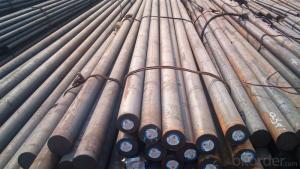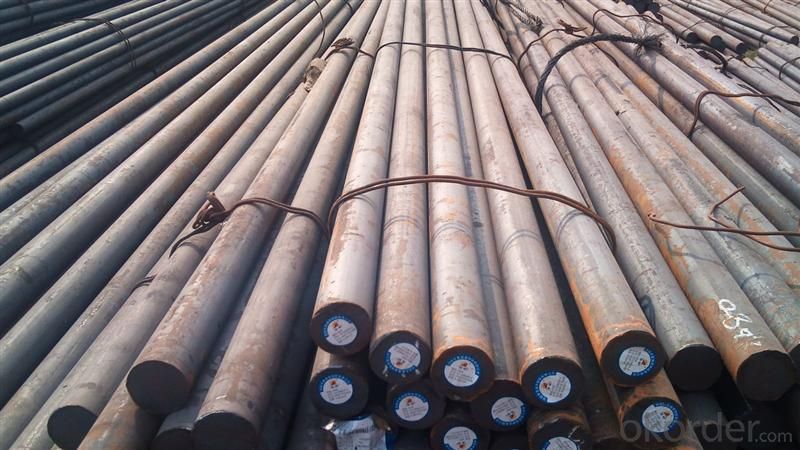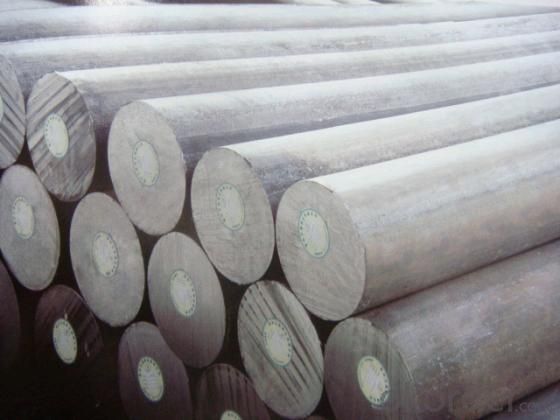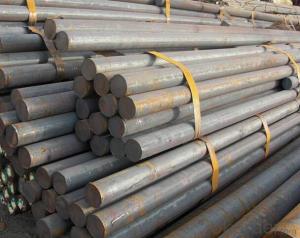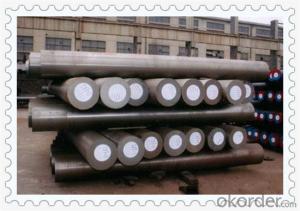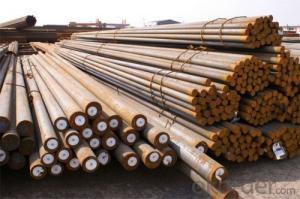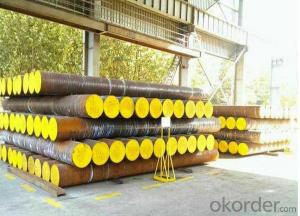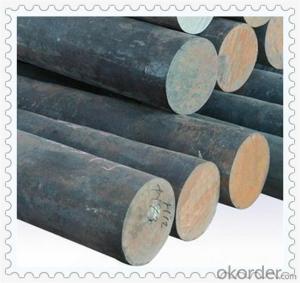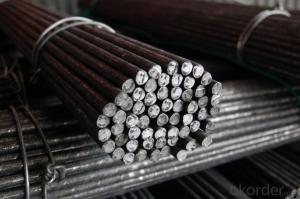Special Steel Scm440 Aisi 4140 Steel CNBM
- Loading Port:
- Tianjin
- Payment Terms:
- TT OR LC
- Min Order Qty:
- 25 m.t.
- Supply Capability:
- 50000 m.t./month
OKorder Service Pledge
OKorder Financial Service
You Might Also Like
Specification
Special Steel Scm440 Aisi 4140 Steel CNBM
Product Description:
1.Dia: 10mm-300mm
2.Length: 3000mm-12000mm
3.Process: EAF + LF + VD + Forged + Heat Treatment (optional)
4.Delivery condition: Hot forged +Rough machined (black surface after Q/T)+ Turned (optional)
5.Forged ratio: no less than 3:1
6.Technical Data: According to the customer's requirement of Chemical Composition, Physical Properties and Mechanical Testing
7.Test: ultrasonic test according to SEP 1921-84 3C/c
8.Material details will be as per agreed technical specifications
9.Certificate of Quality: issued in English, in addition the normal terms
Chemical Composition:
GB | AISI | JIS | DIN | C | Si | Mn | Cr | Mo |
27SiMn | - | - | - | 0.24-0.32 | 1.10-1.40 | 1.10-1.40 | 0.3 | 0.10-0.15 |
40Cr | 5140 | SCM440 | 41Cr4 | 0.37-0.44 | 0.17-0.37 | 0.50-0.80 | 0.80-1.10 | 0.10-0.15 |
35CrMo | 4135 | SCM435 | 34CrMo4 | 0.32-0.40 | 0.17-0.37 | 0.40-0.70 | 0.80-1.10 | 0.15-0.25 |
42CrMo | 4140 4142 | SCM440 | 42CrMo4 | 0.38-0.45 | 0.17-0.37 | 0.50-0.80 | 0.90-1.20 | 0.15-0.25 |
Application:
scm440 hot rolled round bars and forged round bars used in the manufacture of requirements higher than
35 crmo steel strength and conditioning section larger forgings, such as locomotive traction with the big gear,
supercharger drive gear, pressure vessel gear.
Product Show:
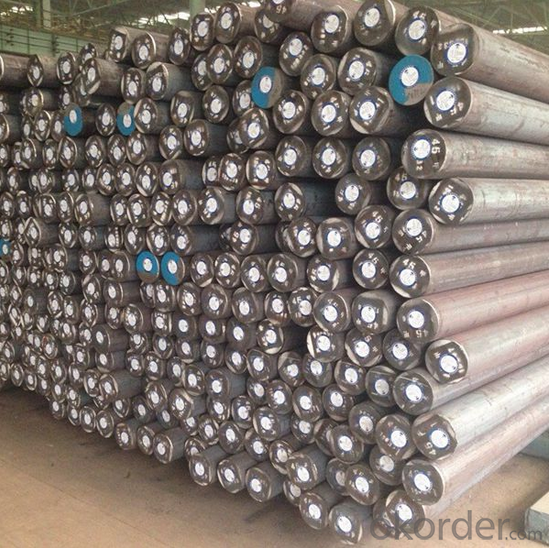
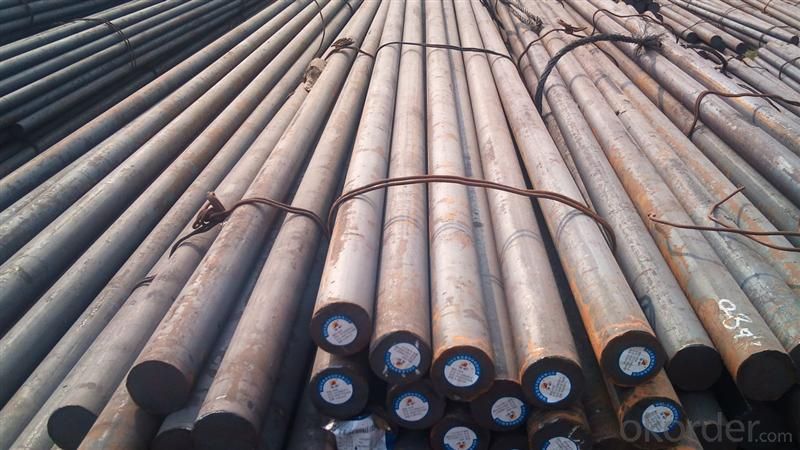
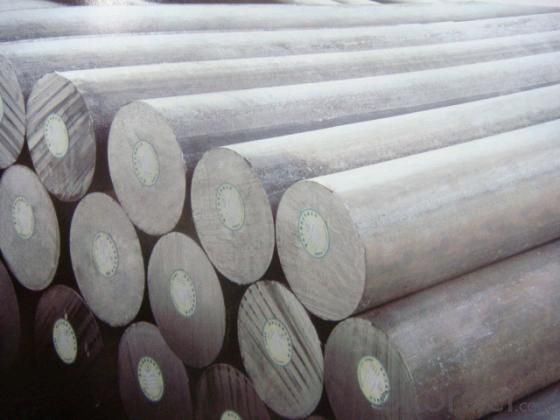
- Q: How is special steel used in the defense manufacturing process?
- Special steel is used in the defense manufacturing process to create weapons, vehicles, and equipment that require high strength, durability, and resistance to extreme conditions. It is used to manufacture components such as armor plates, gun barrels, missile casings, and aircraft parts, ensuring the integrity and effectiveness of defense systems. Furthermore, special steel's unique properties, such as hardness, toughness, and corrosion resistance, make it an essential material for enhancing the performance and protection capabilities of military equipment.
- Q: How does special steel contribute to the machinery manufacturing industry?
- Special steel plays a crucial role in the machinery manufacturing industry by providing high-quality and durable materials for the production of various machine components. This type of steel is specifically engineered to possess exceptional strength, toughness, and resistance to wear, corrosion, and high temperatures. In the machinery manufacturing industry, special steel is utilized in the production of critical components such as gears, shafts, bearings, and cutting tools. These components are subjected to extreme mechanical forces, exposure to harsh environments, and repetitive motion, requiring a material that can withstand such conditions without compromising performance or safety. The exceptional properties of special steel enable machinery manufacturers to produce equipment that is reliable, efficient, and long-lasting. By utilizing this type of steel, manufacturers can enhance the overall performance and durability of their machinery, ensuring optimal functionality and minimizing the need for frequent repairs or replacements. Moreover, special steel allows for the design and production of more compact and lightweight machinery, leading to improved energy efficiency, reduced manufacturing costs, and increased productivity. The high strength-to-weight ratio of special steel enables the production of smaller and lighter components, without sacrificing durability or performance. Furthermore, the corrosion and heat resistance properties of special steel make it suitable for use in industries with demanding operating conditions, such as aerospace, automotive, and energy. It ensures that machinery can withstand extreme temperatures, chemical exposure, and abrasive environments, enhancing safety and reliability. In conclusion, special steel significantly contributes to the machinery manufacturing industry by providing materials with exceptional strength, toughness, and resistance to wear, corrosion, and high temperatures. Its utilization in critical components ensures the production of reliable, efficient, and durable machinery, leading to improved performance, reduced costs, and increased productivity.
- Q: What are the different coating materials used for special steel?
- There are several different coating materials used for special steel, depending on the specific requirements and applications. Some common coating materials include zinc, nickel, chrome, tin, and ceramic coatings. These coatings provide various benefits such as corrosion resistance, improved wear resistance, enhanced aesthetics, and increased durability. The choice of coating material depends on factors like the intended use of the steel, environmental conditions, and desired performance characteristics.
- Q: What are the main applications of special steel in the agricultural sector?
- Special steel has various applications in the agricultural sector, primarily in the manufacturing of machinery and equipment. It is used in the production of durable and high-strength components such as plows, tillers, harvesters, and irrigation systems. Special steel's properties, including corrosion resistance and ability to withstand harsh conditions, make it ideal for constructing farm implements that can withstand the demands of agricultural operations. Additionally, special steel is used in the manufacturing of storage tanks, silos, and structures, ensuring the longevity and reliability of agricultural infrastructure.
- Q: Can special steel be used for making mining equipment?
- Yes, special steel can be used for making mining equipment. Special steel refers to steel alloys that have been specifically designed and manufactured to possess certain properties and characteristics that make them suitable for specific applications. In the case of mining equipment, special steel is often used due to its exceptional strength, toughness, and resistance to wear and corrosion. Mining equipment is subjected to extreme conditions, such as heavy loads, impact, abrasion, and exposure to harsh environments. Special steel grades, such as high-strength low-alloy (HSLA) steel, tool steel, and wear-resistant steel, are commonly employed in the manufacturing of mining equipment to ensure their durability and performance under these demanding circumstances. Special steel allows mining equipment to withstand the stresses and strains encountered during excavation, hauling, and processing of minerals. It can be used for the fabrication of components like bucket teeth, drill bits, cutting edges, and crusher parts, which need to resist wear and maintain their strength even when exposed to abrasive materials. Moreover, certain types of special steel, such as stainless steel, are particularly suitable for mining operations where equipment comes into contact with corrosive substances like acids or moisture. Stainless steel exhibits excellent corrosion resistance, making it suitable for applications such as pipes, tanks, and conveyors used in mining operations. In conclusion, special steel can indeed be used for making mining equipment. Its superior strength, toughness, wear resistance, and corrosion resistance make it a preferred choice for manufacturing various components and structures used in the mining industry.
- Q: What are the different types of special steel coatings?
- There are several types of special steel coatings, including zinc coatings (galvanization), aluminum coatings (aluminizing), chrome coatings (chromium plating), and ceramic coatings, among others. Each type of coating offers unique benefits and properties, such as corrosion resistance, improved durability, increased hardness, and enhanced heat resistance, depending on the specific application requirements.
- Q: What are the main factors affecting the creep resistance of special steel?
- The main factors affecting the creep resistance of special steel are the alloy composition, the microstructure, and the processing conditions. The specific combination of alloying elements and their concentrations significantly influence the material's ability to resist deformation under elevated temperatures and constant stress. Additionally, the microstructure, including grain size and distribution, plays a crucial role in determining the material's creep resistance. The processing conditions, such as heat treatment and thermal cycling, can further affect the creep performance by altering the material's microstructure and mechanical properties.
- Q: How does the heat treatment process affect the properties of special steel?
- The properties of special steel are greatly affected by the heat treatment process. This process involves controlled heating and cooling of the steel to modify its microstructure and, as a result, its mechanical properties. To begin, heat treatment can increase the hardness of special steel. By heating the steel to a specific temperature and then rapidly cooling it through quenching, the steel undergoes a phase transformation that boosts its hardness. This is especially advantageous for applications that demand high strength and resistance to wear, such as cutting tools or bearings. Furthermore, heat treatment can enhance the toughness of special steel. By tempering the quenched steel at a lower temperature, the brittleness caused by rapid cooling can be minimized, leading to improved toughness and ability to withstand impacts. This is crucial in applications where the steel must endure sudden shocks or impacts, like in automotive or aerospace components. Moreover, heat treatment can also improve the overall strength of special steel. Through a combination of heating, cooling, and tempering processes, the steel's grain structure can be refined, resulting in increased strength and resistance to deformation. This is particularly critical for structural applications where the steel must withstand heavy loads or extreme conditions. Additionally, the heat treatment process can influence the corrosion resistance of special steel. By subjecting the steel to specific heat treatment cycles, the formation of certain phases or chemical compounds can be encouraged, leading to enhanced resistance against corrosion or oxidation. This is essential for applications exposed to harsh environments or corrosive substances, such as in marine or chemical industries. In conclusion, the heat treatment process is essential in modifying the properties of special steel. By carefully controlling the heating, cooling, and tempering cycles, the hardness, toughness, strength, and corrosion resistance of the steel can be significantly improved. This allows for the production of special steel with customized properties to meet the specific requirements of various industrial applications.
- Q: How is special steel used in the aerospace sector?
- Special steel is extensively used in the aerospace sector due to its unique properties that make it suitable for various applications. One of the primary uses of special steel in the aerospace industry is for manufacturing aircraft engine components. These components, such as turbine blades, shafts, and casings, are subjected to extremely high temperatures, pressures, and stresses. Special steel, with its excellent heat resistance, high strength, and superior mechanical properties, enables these engine parts to withstand such harsh conditions, ensuring optimal performance and safety. Moreover, special steel is also utilized in the construction of aircraft structures, including wings, fuselage, landing gears, and other critical components. These structures need to be lightweight, yet strong enough to withstand the forces experienced during flight. Special steel alloys, such as stainless steel, are used to achieve this balance by providing excellent strength-to-weight ratios and corrosion resistance. Additionally, special steel finds application in aerospace fasteners, such as bolts, nuts, and screws. These fasteners must have exceptional strength and durability to ensure the structural integrity of the aircraft. Special steel alloys, like titanium alloys, are commonly used in this regard due to their lightweight nature, high strength, and resistance to corrosion. Furthermore, special steel is utilized in the production of aerospace tooling and equipment. These tools, such as molds, dies, jigs, and fixtures, need to be robust, wear-resistant, and capable of withstanding high temperatures and pressures during manufacturing processes. Special steel, with its excellent hardness, toughness, and heat resistance, makes it ideal for such applications. In summary, special steel plays a critical role in the aerospace sector by providing the necessary properties required for aircraft engine components, structures, fasteners, and tooling. Its unique characteristics of high strength, heat resistance, lightweight, and corrosion resistance make it an indispensable material in the production of reliable and high-performance aerospace systems.
- Q: How is high-speed tool steel used in the manufacturing of drills and taps?
- High-speed tool steel is commonly used in the manufacturing of drills and taps due to its excellent hardness, wear resistance, and ability to withstand high temperatures. This type of steel is able to retain its hardness at elevated temperatures, making it ideal for cutting tools that generate heat during operation. It enables drills and taps to effectively cut through various materials, including metal and wood, while maintaining their sharpness and durability. Additionally, high-speed tool steel allows for faster cutting speeds and increased productivity in manufacturing processes.
Send your message to us
Special Steel Scm440 Aisi 4140 Steel CNBM
- Loading Port:
- Tianjin
- Payment Terms:
- TT OR LC
- Min Order Qty:
- 25 m.t.
- Supply Capability:
- 50000 m.t./month
OKorder Service Pledge
OKorder Financial Service
Similar products
Hot products
Hot Searches
Related keywords
